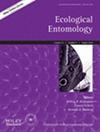仙人掌--茎蛀虫--节肢动物系统中的级联效应使槲寄生从中受益:正反馈
IF 1.6
3区 农林科学
Q2 ENTOMOLOGY
引用次数: 0
摘要
寄生植物可通过诱导寄主植物的抗性/易感性间接改变节肢动物群落结构。在阿塔卡马沙漠,槲寄生植物Tristerix aphyllus会对其仙人掌宿主Echinopsis chiloensis产生级联效应,诱导其对螟虫的易感性,而螟虫的育雏室则被多种节肢动物群落所占据。我们评估了崔斯特里克引发的这些连锁效应是否会对这种寄生植物产生正反馈或负反馈循环。如果槲寄生对节肢动物群落产生的间接影响分别导致槲寄生适应性的提高或降低,那么就会产生正反馈或负反馈循环。具体来说,我们通过野外取样、实验操纵育雏室数量和结构方程建模,评估了育雏室数量通过影响节肢动物营养行会(杂食性动物、蜜食性动物、草食性动物和捕食性动物)的丰度对槲寄生适应性的间接影响。我们发现,育雏室的数量对槲寄生的适应性有积极的间接影响,这可能是通过增加食蜜者的数量来实现的。育雏室的数量与捕食者、食蜜者和食草者的数量呈正相关。然而,蜜食性动物是唯一与育雏室数量和三姐妹健康状况均呈正相关的营养群。这种正反馈循环,加上已知的特异性散播者介导的仙人掌被Tristerix循环再感染的模式,表明槲寄生感染可能最终威胁仙人掌的生存。本文章由计算机程序翻译,如有差异,请以英文原文为准。



Mistletoes benefit from initiating cascading effects in a cactus–stem borers–arthropods system: A positive feedback
求助全文
通过发布文献求助,成功后即可免费获取论文全文。
去求助
来源期刊

Ecological Entomology
生物-昆虫学
CiteScore
4.90
自引率
4.50%
发文量
94
审稿时长
3 months
期刊介绍:
Ecological Entomology publishes top-quality original research on the ecology of insects and related invertebrate taxa. Our aim is to publish papers that will be of considerable interest to the wide community of ecologists who are motivated by ecological or evolutionary theory. The suitability of a manuscript will usually be assessed within 5 days.
We publish full-length Original Articles as well as Reviews, Short Communications, Methods and Natural History papers. In Original Articles, we greatly prefer papers that test specific hypotheses and which have a high degree of novelty. All categories aim for innovative contributions that advance the subject of ecological entomology.
 求助内容:
求助内容: 应助结果提醒方式:
应助结果提醒方式:


